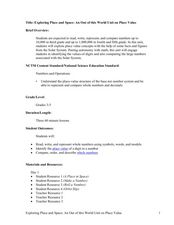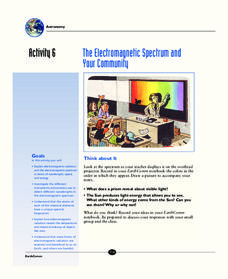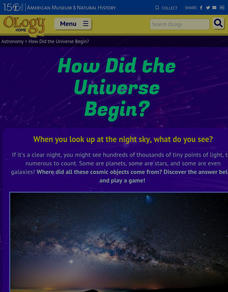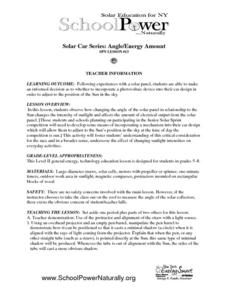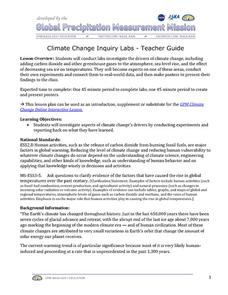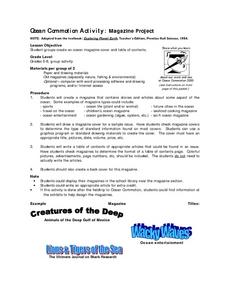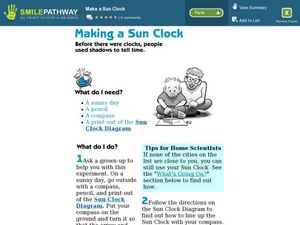American Museum of Natural History
What is Marine Biology?
A marine environment covers the majority of the earth but is arguably the least understood. Teach young scientists about the characteristics of oceans and ocean species using an interactive online lesson. The in-person or remote learning...
Curated OER
Exploring Place and Space
Students explore number values by completing mathematical worksheets in class. In this decimals lesson, students identify the different place values a number has and the use of decimals to represent a fraction of a number. Students...
NASA
Collecting Electromagnetic Radiation
Astronomy is literally over your head, but this lesson will explain how we study it. Young scientists make telescopes, calculate and compare the light gathering power of lenses, and simulate detection of infared radiation. Materials...
It's About Time
The Electromagnetic Spectrum and Your Community
Do you have blossoming astronomers who seek to understand the electromagnetic spectrum? Assist them with exploring electromagnetic radiation and the electromagnetic spectrum as the class conducts various activities to demonstrate...
NASA
Exploring Data
Bring the sun to your class! Young scholars analyze actual solar wind data in the second lesson of a five-part series. Their analysis includes speed, temperature, and density data.
American Museum of Natural History
How Did the Universe Begin?
The Big Bang Theory is more than a television show. Pupils read how Edwin Hubble observed other galaxies and noticed that the galaxies are moving away from each other. Scholars learn about the idea of the big bang and what happened next...
Curated OER
Solar Car Series: Angle/Energy Amount
Does the angle of a solar panel change the output? Emerging engineers find out! Demonstrate for your class how they can angle a straw to match the angle of light rays coming from a source. Then turn them loose to experiment with the...
Curated OER
Comet Myths, Facts, and Legends
Here is an interactive book lesson through which learners explore the facts and stories about comets. The plan is comprehensive, providing background information, standards met, vocabulary, assessment ideas, and more. Though the content...
NASA
Rover Races
Operating a vehicle remotely can be difficult, especially when the vehicle is on another planet. Young engineers get a feel for some of the real-world challenges as they work to program their rovers (blindfolded group members) through an...
NASA
States of Matter
Water, one of the basic needs of humans, is found in all three states of matter on Earth; no other planet—that we know of—possesses this quality. Here is a unit that allows learners to explore through experimentation what it takes to...
S2tem Centers SC
Seasons
Winter, spring, summer, and fall—take the learning of the seasons beyond the elementary level to the middle school classroom. Curious learners begin by watching videos about the seasons and the rotation of planet Earth. Then, they...
California Academy of Science
Exploring Our Growing Need for Water
Pupils explore the amount of water people use in agriculture and for personal use. They compare water usage for various crops to that of raising animals before considering solutions for increased access to safe drinking water worldwide....
Curated OER
The Potential Consequences of Climate Variability and Change
Students analyze the impact of climate variability and change utilizing a broad span of topics over a wide range of grade levels. This three lesson unit is easily adapted for the various instructional levels listed.
Curated OER
School Forest
Sixth graders explore the concept of biodiversity. In this biodiversity lesson, 6th graders discover a variety of planets and animals that live in forests, and how a rotting log benefits that environment. Students also locate seven...
Curated OER
A Design You’ll Dig: Designing a Habitat for Worms
Young scholars discover how worms contribute to the balance of the environment. In this composting lesson, students study the composting and decomposition processes. Young scholars then create habitats for worms that allow them to do...
NASA
Climate Change Inquiry Lab
With global temperatures on the rise faster than ever recorded, the effects of a heating planet could be devastating. Allow learners to discover just what the world is in store for if the warming continues through a series of videos, a...
National Institute of Open Schooling
Water Pollution
Fifteen million children under the age of five die each year due to diseases in their drinking water. Water pollution is the topic of lesson 34 in the series of 36. Scholars, through reading and discussing, study numerous aspects of...
Smithsonian Institution
Water/Ways: The Poetry of Science
Water is the source of life. It appears in poetry in both peaceful and torrential descriptions; it appears in earth science in its liquid, gaseous, and solid states. Combine these interpretations of our planet's most precious and...
Curated OER
Oh Deer!"
Students explore the essential components of a habitat, which is food, water, and shelter. They end the lesson plan by paying the Oh Deer! game.
Curated OER
Magazine Project
Groups of students create magazines that contain stories and images of one aspect of the ocean, and ocean life. The expectations for the final products are quite high, so this lesson will require some effort to properly implement. A...
Curated OER
Making a Sun Clock
In this clock construction lesson, students use a pencil, compass, and sun clock diagram to construct a homemade sun clock. A very interesting lesson on combining images with text.
Curated OER
Sustainable Marine Fisheries
Through a fishing simulation, environmentalists discover consequences of over fishing. Afterward, they discuss how the activity relates to the impact of real-life commercial fishing. They also consider sustainability in the fishing...
Curated OER
Nature's Perfect Recycler
What a great way to start a recycling lesson! Introduce your students to the dung beetle! They will get a kick out of "nature's perfect recycler," when they learn about the scarab beetle's way of life: eating dung and rotting...
NASA
Geographical Influences
"If global warming is real, why is it so cold?" Distinguishing the difference between weather and climate is important when it comes to understanding our planet. In these activities, young scientists look at the climate patterns in a...
Other popular searches
- Lesson Planet Lo Gin
- My Lesson Planet
- Planet Lesson Plans
- Google Planet Lesson Plans
- Lesson Planet Membership Fee
- Lesson planet.com
- Cost of Lesson Planet
- Lesson Planet Cost
- Creative Lesson Planet Earth
- Planets Lesson Plans
- Lesson Planet Home Page
- Lesson Planets Phone Number



